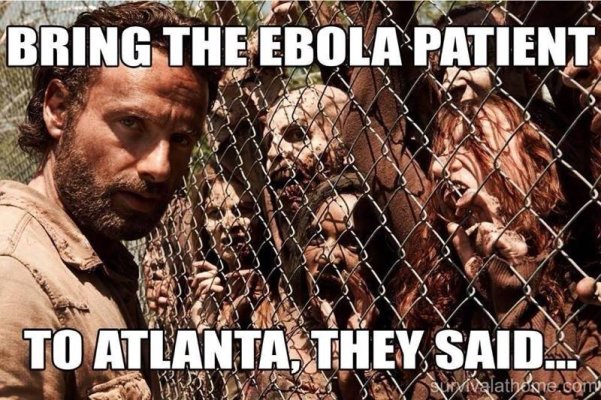I'd be concerned if the disease was transmitted by airborne means, but its not. Also, this may provide a much better opportunity to study the disease and develop a treatment plan and/or vaccine.
I did a quick look, and saw where a CBS story said "It is not contagious through the air"....
But then I read aaronc879's comment:
While the CDC has conceded that “all Ebola virus species have displayed the ability to be spread through airborne particles (aerosols) under research conditions,” its materials assert “this type of spread has not been documented among humans in a real-world setting, such as a hospital or household.” That’s not the same thing as saying it can’t happen, or that airborne transmission is not happening now."
If a virus can spread via airborne transmission (sneezing, etc.) in a lab, then it can spread through airborne transmission. IMO, if you see it happening in a lab, I don't see why there is an assumption it CAN'T happen in the 'real world'. Also, it's quite apparent that many places in Africa don't have elaborate indoor HVAC systems, or even electricity, so when you have simple open windows with fresh air constantly blowing around a one-room hut, and small buildings/homes, the transmission would be vastly different compared to the average Western building with recirculated HVAC systems.
However, this also brings up a point on general hospital infectious control procedures (for all infectious conditions, not just Ebola). As a plumbing engineer for construction projects, I've worked on a number of healthcare projects, not directly on HVAC systems, but have worked with HVAC engineers.
I'm honestly surprised that more infections don't break out with some hospitals than already happens, for the simple fact of how most ventilation is handled for 'isolation rooms' (note: I can't locate the design criteria or specs for the "one of only 4 rooms in the country" that Emory is putting the Ebola patient in, but I am familiar with nearly all other 'isolation rooms').
The standard design for an isolation room is this: depending on the condition that the patient has, they put them in a special negative (or positive) pressure isolation room, that either keeps the funky stuff in the room from escaping (negative pressure) or they can make it positively pressured to keep anything from entering the room (like for a lukemia patient with no immune system). This is typically handled with the flip of a switch. However, when it's negatively pressurized to keep the funky stuff in, all that air does is get sucked up through the building and out the roof (or side of the building) by an exhaust fan. Sometimes, they have one fan shared among several isolation rooms in older hospitals, or even newer ones.
So not only do you have the chance that some MRSA or other aerosolized bad thing could work its way down the ventilation system into other isolation rooms, but (more importantly), the exhaust air from the 'standard' isolation room is NOT sterilized or contained before ejecting it outside the building. (again, I'm not referring to the special Emory Ebola room, but every "standard" hospital isolation room)
And guess what? New HVAC codes require more fresh air intake for all buildings, especially healthcare settings. And guess where all that fresh air is coming from?
It's from outside the building.
Do you think the HVAC engineers think about the air they are exhausting from the exhaust fans for those isolation rooms with all that funky stuff? Sometimes yes...but surprisingly, many times, no. But even if they do place the exhaust fan discharge 'far away' from the fresh air intake, do you realize how relatively small the exhaust fan air flow volume is, and how relatively massively large the fresh air intake is for an entire hospital?
Not only is that exhaust air with possible funky airborne pathogens just pushed out of the hospital, free to gradually rain down on people entering/leaving the hospital, but it can also get sucked up by the massive fresh air intake to get redistributed back through the hospital ventilation system to all of the other rooms. Especially depending on how the prevailing winds are any given day.
Some HVAC air handling units have ultraviolet 'air cleaners' to have SOME level of disinfection - but that's typically only on the air that's recycled from the building directly back into the building. Not on the 'fresh outside air'. And the exhaust fans don't have ultraviolet disinfectors to sterilize the air before exhausting it.
No, I'm not typing this with a tinfoil hat. Just offering a dose of realism on how things are in the 'real world', and a small snippet observation that things aren't necessarily perfect just because we don't see massive outbreaks on the news every week. There are plenty of opportunities for things to go wrong in many settings. Often times we simply don't know or it's not publicized.

